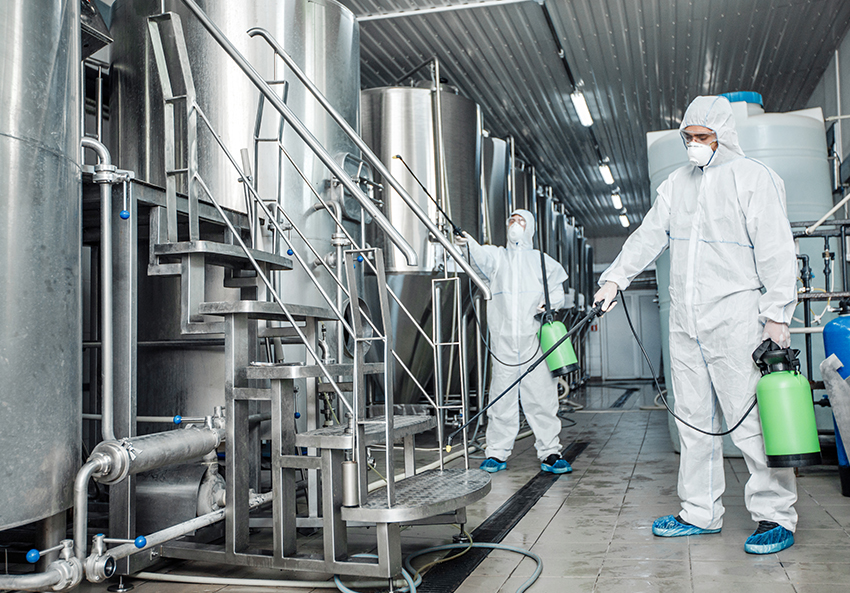Food production is a process that requires full compliance with hygiene and safety standards at every step. Every product produced meets the consumer directly; this makes the reliability of quality control mechanisms, cleaning protocols and chemicals used critical. One of the most important components in ensuring hygiene in industrial food production is chemical cleaning agents.
Cleaning chemicals such as caustic soda, nitric acid, hypochlorite solutions, acid-alkaline CIP products; not only clean the machines, but also ensure the sustainability of production, product quality and consumer health.
In this article, we will examine in detail the role of chemical cleaning products in the food sector; their intended use, correct application requirements and why they are indispensable in the sector.
WHY IS HYGIENE CRITICAL IN FOOD PRODUCTION?
Microbial contamination in the food industry is a risk factor that directly affects both product quality and consumer health. Hygiene practices should be an integral part of the production process, especially in facilities where perishable foods such as milk, cheese, yogurt, fruit juice, meat processing and bakery products are produced.
Microbiological Risks:
- Listeria monocytogenes
- Salmonella spp.
- E. coli
- Staphylococcus aureus
The only way to prevent the proliferation of such pathogens is to provide cleaning at a microscopic level, not just on the surface. This is only possible with correctly formulated cleaning chemicals.
THE MOST USED CLEANING CHEMICALS AND THEIR ROLES
1. Caustic Soda (Sodium Hydroxide / NaOH)
The most widely used alkaline cleaner. It is very effective in dissolving oily, protein and organic residues.
Area of use:
- Cleaning of milk residues
- Degreasing of meat processing machines
- Primary cleaning agent in CIP lines
2. Nitric Acid (HNO₃)
It is one of the most effective acidic cleaners. It is used in cleaning mineral deposits, calcification and water stones.
Area of use:
- Heat exchangers
- Milk pasteurizers
- Mineral cleaning on metal surfaces
3. Hypochlorite Solutions (Sodium Hypochlorite)
Used for disinfection purposes due to its bactericidal and virucidal effect.
Area of use:
- Surface cleaning of food processing areas
- Disinfection of water systems
- Hygiene of packaging lines
4. CIP (Clean-In-Place) System Products
Offers on-site cleaning solutions for tanks, pipes and closed systems. Cleaning process is carried out without the need to disassemble the system.
- Alkaline CIP: Removes organic residues
- Acidic CIP: Removes mineral and lime deposits
ADVANTAGES OF CHEMICAL CLEANING PRODUCTS
- Save time: Much faster compared to manual cleaning.
- Reduces human error: Provides homogeneous cleaning in automatic systems.
- Reduces costs: Extends equipment life, reduces risk of failure.
- Increases hygiene standards: Provides support in certification processes (HACCP, ISO 22000).
4 RULES OF CORRECT APPLICATION IN CHEMICAL CLEANING
- Choose the Right Chemical: Alkaline products should be used for oil and acidic products for lime.
- Adjust the Dosage: Excessive concentration damages surfaces; low dosage reduces the cleaning effect.
- Pay Attention to Contact Time: Each chemical has a certain period of time it must remain on the surface to be effective.
- Do Not Skip the Rinsing Stage: Chemical residues can negatively affect the taste and safety of the product.
COMPATIBILITY OF CHEMICALS AND SURFACE TYPES
- Prevents equipment wear
- Increases food safety
- Provides convenience in certification processes
Cleaning in industrial food production is the guarantee of product quality and the basis of consumer trust. Effective cleaning protocols applied with the right chemical products; provide not only hygiene but also efficiency, sustainability and reputation.
Faser Kimya not only keeps production areas clean with the cleaning chemicals it offers for the food industry, but also provides businesses with a competitive advantage.


